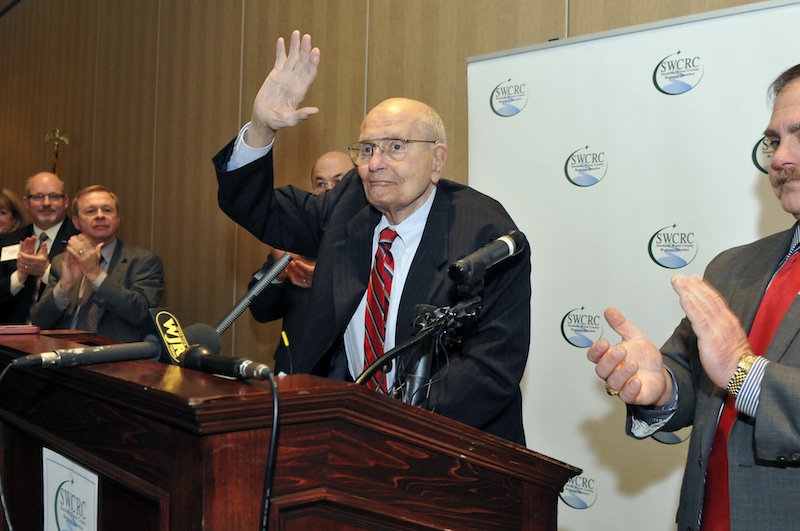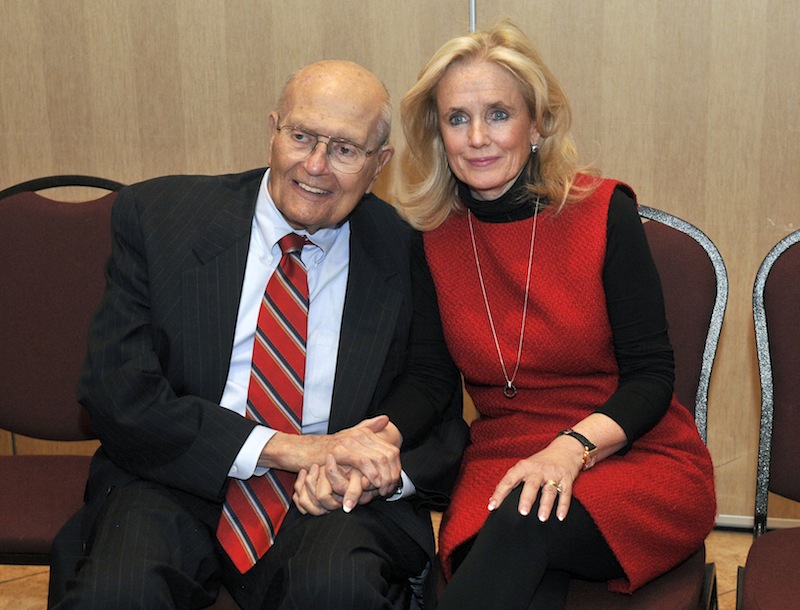SOUTHGATE, Mich. — Rep. John Dingell, who played a key role in some of the biggest liberal legislative victories of the past 60 years, said Monday that he will not try to add to what is already the longest congressional career in history.
The Michigan Democrat, who was elected to his late father’s seat in 1955 and has held it ever since, announced his decision while addressing a chamber of commerce in Southgate, near Detroit. Afterward, he told reporters that he will not run for a 30th full term because he could not have lived up to his own standards.
“I don’t want people to be sorry for me. … I don’t want to be going out feet-first and I don’t want to do less than an adequate job,” said the 87-year-old Dingell, who cut a physically imposing figure in his prime but now uses a cane or motorized cart to get around the Capitol.
He fueled speculation that his 60-year-old wife, Debbie Dingell, who was at the event, might run for his seat, saying she would have his vote if she does. She repeatedly deflected questions about whether she would run, saying she would only talk about her husband.
After winning a special election for his father’s seat in 1955, Dingell gradually acquired seniority and clout, eventually becoming chairman of the powerful House Energy and Commerce Committee and earning a reputation for being one of Washington’s sharpest government watchdogs.
In June, Dingell broke the record for the longest serving member of Congress held by the late Sen. Robert Byrd of West Virginia, but his congressional experience goes back even further than his 1955 electoral win. As a congressional page in 1941, he watched firsthand as President Franklin D. Roosevelt called on Congress to declare war on Japan in his “Day of Infamy” address.
Dingell assembled a record that epitomized the power of the legislative branch of government. His longevity testifies to the formidable willpower of a man nicknamed “Big John” for his 6-foot-3 stature and his sometimes imperious demeanor.
“John is one of the giants in American history,” said Republican consultant and pollster Steve Mitchell. “There’s nothing like it.”
Counting Dingell’s time as a page, the only person who rivaled the longevity of Dingell’s involvement in federal affairs was President John Quincy Adams, Mitchell said.
Dingell said his “single most important” vote was for the 1964 Civil Rights Act that eliminated unequal voter registration requirements and outlawed racial segregation in schools, workplaces and public areas — a move he said almost cost him his seat. Dingell played a key role in the creation of the Medicare program in 1965, and wrote the 1970 National Environmental Policy Act and the 1973 Endangered Species Act.
Dingell presided over the House when it passed Medicare, and he loaned the gavel he used that day in 1965 to Speaker Nancy Pelosi for the chamber’s approval of President Barack Obama’s federal health care overhaul in 2010. Dingell had introduced a universal health care coverage bill in each of his terms, and he said one of his proudest moments was sitting next to Obama as he signed the law.
“As an original author of the Affordable Care Act, he helped give millions of families the peace of mind of knowing they won’t lose everything if they get sick,” Obama said in a statement Monday, calling Dingell “one of the most influential legislators of all time.”
Dingell also counts among his accomplishments helping to establish and expand the Detroit River International Wildlife Refuge southwest of Detroit in an area dubbed “Downriver”— known more for its industry than its natural beauty.
Until 2009, Dingell was the top Democrat on the House Energy and Commerce Committee for 28 years and fended off pressure for tougher emission standards for the auto industry. He lost the chairmanship over complaints from Democrats that he was too slow to deal with global warming and other environmental issues.
“What a lot of Republicans don’t realize is that the (fuel-efficiency) standards on automobiles would have been far more rigid and much higher than they are today had it not been for John Dingell,” Mitchell said.
His hometown, the Detroit suburb of Dearborn, was home to a Ford Motor Co. factory that was once the largest in the world.
Dearborn Mayor John O’Reilly, who served as a legal counsel for Dingell in the 1980s, said he will miss Dingell’s ability “to get things done” at home and in Washington. It is a double blow to Michigan, O’Reilly said, when combined with the impending retirement of Sen. Carl Levin, another powerful and longtime Democrat.
“Our economy is no longer a stand-alone economy like it was when they first came in — it’s now part of a global economy,” O’Reilly said. “Those issues require people with a good knowledge base, a good history and understanding of the issues. We’ve been blessed.”
As chairman of the Energy and Commerce Committee from 1981 to 1994, Dingell made the panel one of the most aggressive and wide-ranging in Congress. He became known for sharply worded investigative letters dubbed “Dingell-grams” sent to agencies.
Michigan Democratic Rep. John Conyers, who served on Dingell’s staff before he was elected to Congress in 1964, will become the new dean next year if he wins re-election.
If Dingell has a reputation for being hard-nosed, he also maintains the old congressional tradition of cordiality with colleagues, friend and foe. He lamented during his speech Monday that Congress has grown deeply “rancorous” and “divided,” and has become “a disappointment” to him.
That is not why he is leaving, he added, but it is time to “enjoy a little bit of peace and quiet.”
Born in Colorado Springs, Colo., Dingell grew up in Michigan, where his father was elected to Congress as a “New Deal” Democrat in 1932. After a brief stint in the Army near the end of World War II, the younger Dingell earned his bachelor’s and law degrees from Georgetown University.
Following the sudden death of his father in 1955, Dingell, then a 29-year-old attorney, won a special election to succeed him.
Send questions/comments to the editors.




Comments are no longer available on this story